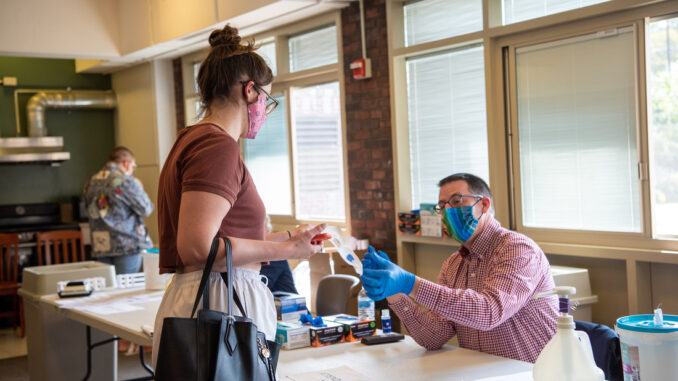
As of March 19, there have been 134 total positive COVID-19 cases among students who have been on campus, and 24 total positive cases among employees since Jan. 1. The entirety of the Fall semester saw just 75 total reported cases.
On March 1, in a campus wide Daily Digest email, it was reported that 16 students and two employees tested positive. A relatively high number of students testing positive compared to recent weeks.
At this time, the college does not know the exact cause behind the uptick, nor does it believe that the rise in cases is related to any new or more contagious strains of the virus.
“We do not have a specific cause,” said Vice President for Student Affairs Stephanie Blaisdell. “As the county cases were still low and the increase seems to have been specific to our population it is most likely due to small gatherings where safety protocols are not being followed.”
According to Blaisdell, the 25 active cases as of March 19, are a combination of related cases in which infections can be linked to known cases, approximately two to four people per case, and individual cases, where infections were of a familial or unknown source. Blaisdell also added that there are no known super spreader events, but that the school is “vigilant” and continuing to monitor and watch for policy violations.
“One big reason for more cases is the fact that we are testing everyone every week,” said Chief of Staff and Vice President for Communication Shelly Wright. “We did 10,750 tests all last fall and we’ve already done 20314 tests since Jan. 1. The more you test, the more cases you are likely to find.”
Since Feb. 8, students and employees have been mandated to be tested every week they are on campus.This includes students who live off campus but have in-person classes. They can be tested at Awosting Hall Monday-Thursday via pool testing, or sign up in advance for a polymerase chain reaction (PCR) nasal swab test on Fridays.
“I think SUNY New Paltz’s policy for getting tested is much better this semester than last,” said Shannon Moran, a graduate student studying English. “Last semester’s system of being called to get tested on a random day and time was frustrating when it did not correlate with a student’s schedule. I like that testing is more widely available this semester.”
Awosting and Mohonk both serve as the campus’ primary quarantine and isolation halls. Isolation is for those who tested positive for COVID-19, and quarantine is for those who have been exposed to someone with COVID-19.
This begs the question of whether the school is equipped to adequately isolate or quarantine students who have tested positive or been exposed.
“We have capacity within our existing facilities because we can put isolating students together [and] still have plenty of room,” Blaisdell said.
While there is an increased number of students who have tested positive in the campus community, SUNY New Paltz’s numbers have remained comparatively low.
According to the Poughkeepsie Journal, Marist voluntarily shut down its campus and ordered its predominantly freshman dorms, Marian and Champagnat halls, to temporarily quarantine. This means those students will have to attend classes virtually and limit leaving their rooms unless it is to pick up food or for medical reasons.
The University of Pittsburgh saw an 83% rise in positive cases according to a COVID-19 dashboard update from March 18. The statement encourages students to avoid new close contacts to help slow the spread during the spike of new cases.
According to a New York Times continuous article, last updated on March 2, there have been over 535,000 total reported cases on college campuses across the country, with a 30% increase for 2021.
While some states have started to loosen COVID restrictions, or cancel them altogether, New York continues to require masks and social distancing regulations set by the CDC.
“We continue to engage students and others to help message diligence in following safety policies,” Blaisdell said. “We have an ‘Influencing student behavior’ group, led by Mike Patterson, that has worked on this since this summer. We also have an ‘Enforcing Student Behavior’ group led by Robin Cohen LaValle to ensure fair and consistent enforcement mechanisms.”
